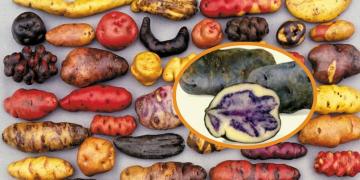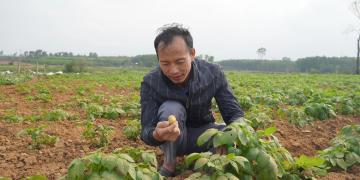Poland: What does the future hold for potato producers in Poland?
In Poland, a decrease in the area of potato cultivation has been observed for a long time. In addition, there is a very small number of planting producers and the fear of the occurrence of ring rot.

The National Council of Agricultural Chambers reported these issues to the Minister of Agriculture and Rural Development, drawing attention to the decrease in the area of crops and the lack of availability of Polish potatoes on the market, which is particularly painful for seed potato producers, whose number has shrunk to only 169.
Potato production - what are the challenges?
Over the years, there has been a systematic reduction in the area of potato cultivation in Poland . The reasons for this state of affairs are complex. Producers are struggling with the lack of effective plant protection products necessary to protect plantations from diseases and pests. Climate change, manifested by periodic droughts and heavy rains, is also a growing problem. Additionally, the pressure of aphids is increasing, which leads to seed potatoes being infected with viruses and disqualified. All this is happening at increasing production costs. However, the biggest and most severe problem remains potato bacteriosis.
Consequences of detecting bacteriosis
Detection of potato bacteriosis , even in a single sample taken from seed material (200 tubers from 25 tons), results in a decision by the State Plant Protection and Seed Inspection (PIORIN) to dispose of all the seed material produced on a given farm . Moreover, PIORIN decisions often also cover farms of farmers from the vicinity, for example in the case of using the same agricultural equipment.
In previous years, there were regulations enabling farmers who implemented the PIORIN decision on disposal to receive compensation from the state budget. These compensations, covering 80% of the difference in the price that the farmer would have obtained from the sale of seed material, were an opportunity to recover production costs. They were particularly important for seed farms, where inputs are the highest, providing them with financial protection. Unfortunately, the regulation of the Minister of Agriculture and Rural Development of June 10, 2024 changed the regulations, eliminating these subsidies, which were previously the only security for farmers growing potatoes.
Seed potatoes on the Polish market
The entire Polish potato sector is based on 169 entities producing seed material . These farms supply key market segments – 3 French fry factories (purchasing approx. 450 thousand tons for over PLN 400 million), 3 crisp factories (approx. 400 thousand tons for over PLN 350 million), approx. 10 starch factories (approx. 450 thousand tons for over PLN 300 million) and approx. 12 larger edible potato packing plants (approx. 1 million tons for over PLN 1 billion).
In total, potato production in Poland amounts to over 2.3 million tons, bringing farmers over PLN 2 billion in revenue and generating over PLN 100 million in revenue to the state budget from VAT and CIT, as well as thousands of jobs. This sector is an important element of the country’s food security. This market is directly dependent on the aforementioned 169 seed potato producers, who had their subsidies of around PLN 15-20 million per year taken away for reasons not fully understood by the industry, which indicates a lack of full consideration of the economic, social and financial consequences of this decision on the state budget.
KRIR and postulates
In view of this situation, the National Council of Agricultural Chambers has presented specific proposals to the Minister. It requests the elimination of the recognition of plantations with negative results for bacteriosis as “probably” infected, postulating an increase in the number of tests to prove the health of potatoes. According to the industry, this would reduce compensation by over 70% and develop the sector.
The key postulate is to restore compensation for seed farms affected by potato bacteriosis by amending the regulation of 10 June 2024. KRIR demands that compensation amounts per hectare be published before planting begins, i.e. in January of each year. Additionally, it requests to consider restoring compensation payments for the production years 2022, 2023 and 2024, pointing out that PIORIN decisions in these years ordered the disposal of nearly 30 thousand tons of seed material, which in 2022 constituted over 20% of the entire national production. The regulations eliminating subsidies had retroactive effect, covering farmers in whom bacteriosis was detected in previous years.
The Council also calls for testing potatoes planted in Poland, because currently over 70% of the market is out of control, which leads to contamination of cultivated land. It is necessary to plant only healthy material. Other important demands include tightening the compensation payment system, settling the accounts of dishonest farmers and supporting injured farmers who disposed of the material. It is also requested to allow an appeal against a positive test result for bacteriosis by an independent laboratory, including in other EU countries. KRIR also proposes taking samples for bacteriosis from the field before digging, which would reduce the risk of spreading the disease. The proposals also include completing the testing procedure together with appeals by the end of the calendar year and issuing clear guidelines and interpretations by the services so that farmers and inspectors are familiar with the requirements before establishing seed plantations.
Food security at risk?
Although the state is obliged to fight quarantine diseases and ensure food security , and farmers are supposed to support them in this through the phytosanitary regime, farmers were left alone in the fight against bacteriosis after the liquidation of compensation. The consequence of this situation is the threat of a collapse of Polish potato production and the need to import them, despite shortages in other EU countries as well. Maintaining domestic production of potatoes and seed potatoes is crucial to becoming independent from supplies from abroad. Without government support, this negative scenario becomes real.
Support from the state budget in the form of subsidies is essential for domestic production and will prevent price increases. Currently, farmers are afraid to undertake risky seed potato production with such high risk and lack of security. Increased risk, combined with the abolition of subsidies, may lead to a collapse in plantings, disruption of supplies to factories and packing plants supplying supermarkets used by Polish consumers. Saving PLN 15 million on subsidies may cause a collapse in a market worth billions, leading to lack of access to Polish seed potatoes or the need to import expensive material from other EU countries. The potato market, which generates jobs and taxes, is currently under threat due to the withdrawal of subsidies from farmers, which were a kind of compensation for the risk of bacterial blight.
Fuente: topagrar.pl




